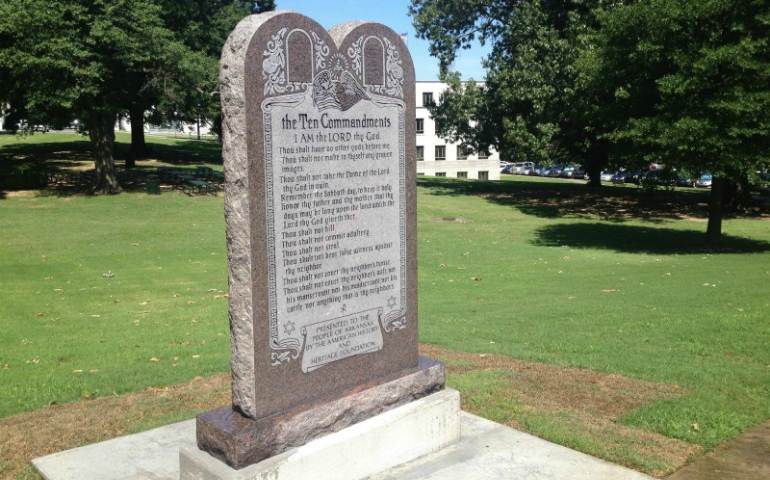
A statue of the Ten Commandments is seen after it was installed June 27, 2017, on the grounds of the state Capitol in Little Rock, Arkansas. (Steve Barnes/REUTERS)
Update: The newly installed Ten Commandments monument on the Arkansas state capitol grounds was destroyed June 28, according to Reuters reports.
The suspect, Michael Reed, faces three charges, including felony defacing an object of public interest. Police say that Reed drove his vehicle into the granite slab.
Following years of heated debate, a monument inscribed with the Ten Commandments was installed June 27 on the grounds of the Arkansas state capitol building.
The American Civil Liberties Union of Arkansas and other opponents have vowed to sue over the controversial display. They believe the privately funded monument is an unconstitutional endorsement of religion.
"If they put it up, they're going to signal to people who don't subscribe to that particular version of the commandments and non-believers they are second-class citizens and we will file suit," Holly Dickson, the ACLU's legal director, told U.S. News and World Report when the monument was approved in May.
Supporters of the monument, like Republican state Senator Jason Rapert, say the display honors the roll the Ten Commandments have played in the history of the nation's law.
"We're very happy today to see Act S1231 of 2015 fulfilled with the installation of the Ten Commandments monument today, and we're very grateful to all of those who donated to the American Heritage and History Foundation," Rapert told USA TODAY.
Act S1231 is a law, sponsored by Rapert, which required the monument be built somewhere on Capitol grounds.
The American Heritage and History Foundation raised more than $26,000 to build the 6 foot, 6,000 pound tablet through a GoFundMe page created by Rapert on its behalf.
Rapert defended the bill against those who seek to "belittle or create controversy" over the monument citing Van Orden v. Perry, the Supreme Court decision that ruled Texas could display a Ten Commandments monument at their state capitol. This monument is a replica of Texas’ display.
He noted that the Ten Commandments are also displayed in the United States Supreme Court building saying, "if the Ten Commandments is good enough for the United States Supreme Court, it's good enough for the people of Arkansas."
Adding to the debate, the Temple of Satan had tried to install their own statue of Baphomet, a goat-headed, angel-winged creature accompanied by two children smiling at it. The statue, which was once destined for the state capitol building of Oklahoma, was blocked yet again by a law requiring legislative approval before monuments can be considered.
State Supreme Courts have historically been less lenient with religious monuments on public property.
The state Supreme Court of Oklahoma ordered the removal of a Ten Commandments monument in Oklahoma in 2015 on the grounds that it violated a provision in the state constitution prohibiting use of state property to further religions. A similar monument was removed from a town hall in New Mexico in 2014 when a judge ruled it violated the First Amendment.


